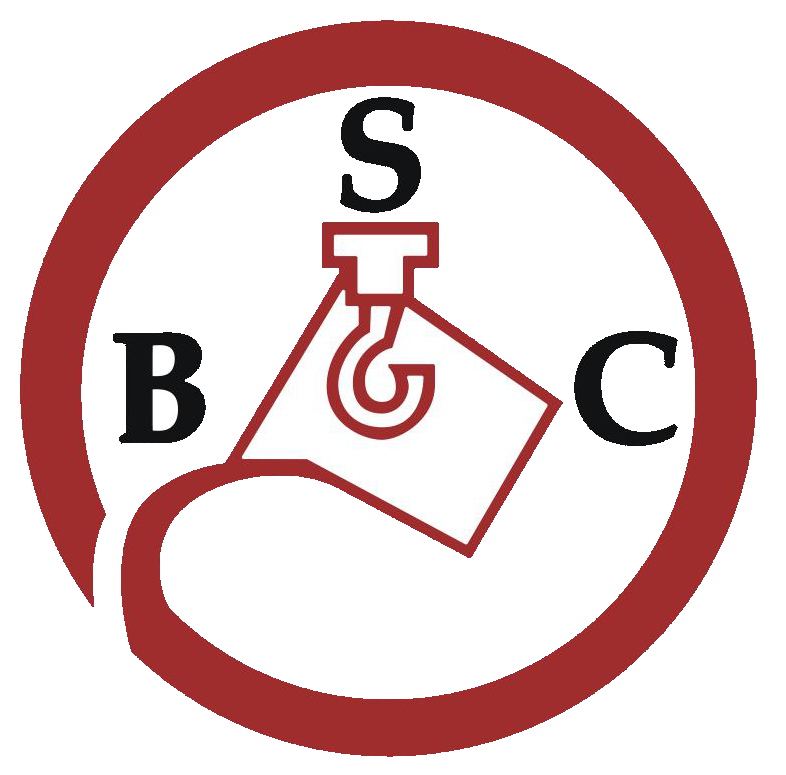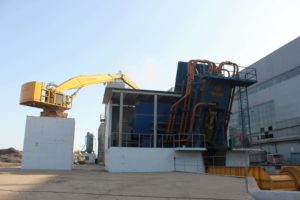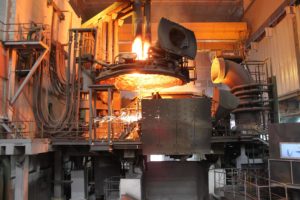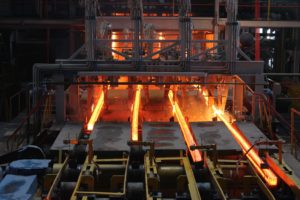Baku Steel Company, Azerbaijan's first metallurgical company, has been engaged in steel production since May 2001. Ever since the start of its operations, it has taken steps to move forward with its high quality and innovations. It is no coincidence, that though expanding its business scope, the Company has now two electric arc furnaces and three rolling lines, with the annual steel production capacity reaching 1,000,000 tonnes (one million tonnes).
The process operations in the 60-tonne Electric Arc Furnace begin with the preparation and composition of the charging material. The scrap metal delivered to the plant is sorted, sheared, pressed for briquetting, and sent to the charging material areas of the shops in accordance with the standard. The scrap metal contains 65% of scrap steel, 10% of cast iron scrap and 10% of HBI or pellets (DRI) to produce 87 to 90% of finished products (58-60 tonnes of finished billers are produced from 66-67 tonnes of scrap metal). Both electric arc furnaces operate with metal scrap. Therefore, the scrap metal is delivered in sheared form to the Charging material site, where it is loaded into buckets and fed to the furnace.
Baku Steel Company, the flagship of the black metallurgical industry in the Republic of Azerbaijan, tries to keep on top of the latest developments in the technologies, scientific and technical fields to maintain its leading position. To that effect, in order to increase the production capacity of the charging material area a modern scrap shearing press and bundler have been procured from Vezzani Company and installed at the Company's premises. In order to increase the production capacity, the Company has produced and installed a more up-to-date 70-tonne Electric Arc Furnace (Siemens VAI, Germany) with an automatic hot metal process and fully electronic safeguarding systems. Besides, a gas/dust catcher has been procured and installed from Demora to ensure clean environment and remove polluted air from the furnace.
The 70-tonne Electric Arc Furnace is equipped with new systems to control the feeding of carbon containing materials to the furnace. Additionally, three combined 4 MW RCB burners optimise the process of blowing oxygen and carbon to the electric arc steel furnace, as well as perfectly absorb energy from the exothermic reactions of gas, oxygen and carbon. The operation of the main power units as part of the steel melting process is automatically controlled by an application program.
The hot metal from the furnace is received by steel ladles. Ferroalloys, lime and other components are added to the hot metal at the time of release to ensure that the produced steel meets the requirements of the standard. The hot metal received into the ladle furnace is processed, and the temperature, chemical composition, etc. are adjusted according to the order. Once processed in the ladle furnace upgraded by CVS Company, the hot metal is routed to the Continuous Billet Casting Machine.
The continuous casting machine casts 6 to 12 metre long square billets with cross sections from 100x100mm to 150x150mm in four streams over 30-40 minutes. The billets are then automatically cut and routed via the cooling tables to the billet processing area. Technical inspection of the billets is conducted in the billet processing area to identify defects. Then, the billets in the sizes in accordance with the order are sent to the reheating furnace of the rolling area, to the rolling shop.
There, the square billets are heated in the reheating furnace and thermo mechanically processed to produce rebars in various sizes (i.e. Ø 10-32 mm), and dia 5.5mm, 7mm and 8mm rolled wire. 40-125mm angles, 80-140mm channels and 100-140mm double T-irons are produced on rolling line No.2 upgraded by Atamet Company (Turkey).
Since January 2016, round billets have been produced at Electric Steel Melting Shop No.2 where reconstruction activities were carried out back in 2014. The double train round billet casting machine designed by VNIIMETMASH Institute is equipped with up-to-date systems. To prevent contamination from outside impacts during the round billet casting, the billets are cast in a closed system made of special refractory materials.
At present, depending on the demand, the 130mm, 160mm, 170mm, 190mm and 220mm billets are manufactured in up to 3000mm - 6000mm - 12000mm lengths. These billets are intended for pipe rolling and therefore, made of high quality steels, mainly St20, St 45, 09G2C, 32G2, etc.
Always focused on innovations, the Company's management utilises cutting-edge "BAIRD" DV-6 (USA) and "SHIMADZU" PDA-7000 (Japan) optical emission spectrum analysers to control the metal compositions and quality of our products throughout the steel melting process. Samples taken from the furnace, ladle furnace and continuous casting machine are sent to the laboratory by compressed air, and the analysis results are displayed on the control computer.
Here at Baku Steel Company, the quality is our highest indicator, which we will continually improve.





